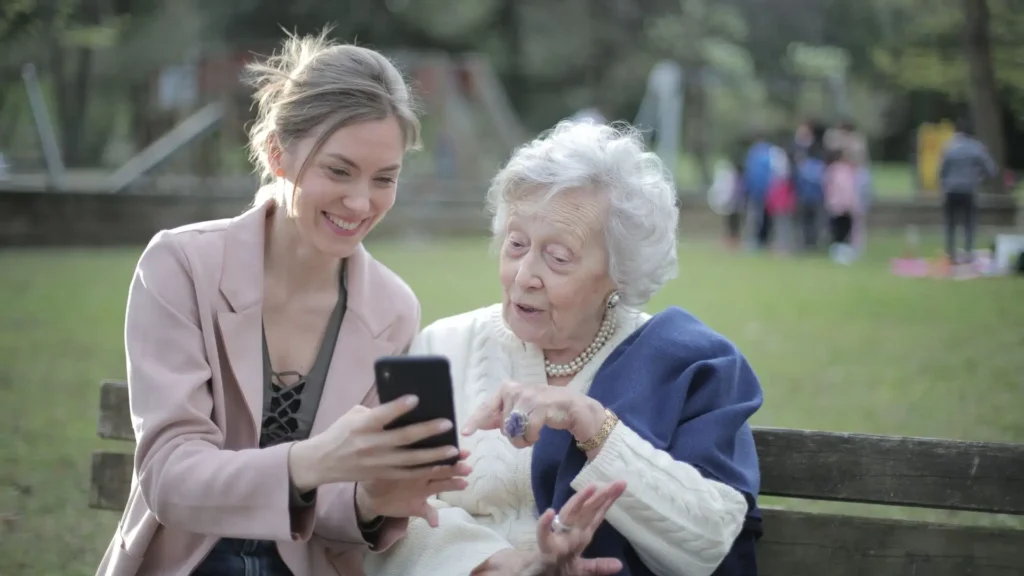Dementia is a collective term for various brain disorders that affect memory, thinking, and behavior. It is a progressive condition, meaning it worsens over time, often leading to significant changes in personality and cognitive function. For caregivers, witnessing these changes can be heart-wrenching.
The connection between dementia and grief is profound. As caregivers, you may experience a sense of loss long before the actual death of your loved one.
Each day can feel like a goodbye to the person you once knew. This anticipatory grief emerges as you grapple with the gradual decline.
“The emotional toll on caregivers can be overwhelming, as they navigate their own feelings of sadness, frustration, and helplessness.”
Caregivers often find themselves in a constant state of mourning, not just for the person they are losing, but for the life they had hoped to share.
The Emotional Rollercoaster
Being a caregiver for someone with dementia often feels like an emotional rollercoaster. Caregivers experience a wide range of feelings, from sadness and frustration to guilt and anger. It’s not uncommon to feel overwhelmed by these emotions, especially as you watch a loved one decline.
According to a study, nearly 40% of caregivers report symptoms of depression, highlighting the significant impact of caregiving on mental health.
This emotional burden can lead to feelings of isolation and helplessness, making it essential to acknowledge these struggles.
To cope with this emotional turmoil, finding a support system can be life-changing. Engaging with support groups or talking to friends and family can help alleviate some of the weight on your shoulders.
Practicing mindfulness or journaling can provide an outlet for your feelings, allowing you to process your emotions more effectively. Remember, it’s okay to seek help and prioritize your well-being amidst the challenges of caregiving.
Physical Toll of Caregiving
The role of a caregiver comes with significant physical demands. Lifting, moving, and assisting someone with dementia can take a toll on one’s body. This constant physical strain often leads to exhaustion and fatigue.
Caregivers frequently face various health issues. Common problems include back pain, joint issues, and sleep disturbances. Many caregivers report experiencing higher levels of stress and anxiety, which can further exacerbate physical health concerns.
This is why self-care is crucial. Taking time for yourself is not just a luxury; it is a necessity. Simple practices like stretching, taking short walks, or ensuring you have a few quiet moments each day can make a difference.
Prioritizing your health allows you to provide better care and maintain your own well-being. Remember, you cannot pour from an empty cup.
Financial Strain
Caring for someone with dementia can lead to significant financial strain. The costs associated with dementia care often add up quickly.
From medical expenses to daily living aids, caregivers may find themselves facing unexpected financial burdens.
On average, dementia care can range from $50,000 to $100,000 annually, depending on the level of care required.
Here’s a brief overview of common costs:
| Expense Type | Average Cost |
|---|---|
| In-home care | $20,000 – $40,000 |
| Nursing home care | $80,000 – $100,000 |
| Medical supplies | $2,000 – $5,000 |
This financial burden can significantly impact a caregiver’s finances, often leading to stress and anxiety. Fortunately, there are resources available.
Websites like NIA provide valuable information on financial aid options for caregivers. Seeking assistance can make a world of difference.
Social Isolation
Social isolation is a common struggle for caregivers of individuals with dementia. As the demands of caregiving increase, many find themselves withdrawing from social activities and connections. This loss of social interaction can lead to feelings of loneliness and despair.
“Loneliness is not a lack of company; it is a lack of purpose.” This sentiment rings especially true for caregivers. The emotional toll of caregiving can strain personal relationships, leaving caregivers feeling isolated, even among friends and family.
However, staying socially connected is crucial for mental well-being. Here are some effective ways to maintain those vital social ties:
- Schedule regular phone calls or video chats with friends and family.
- Join a support group, either online or in-person, to share experiences with others in similar situations.
- Set aside time for hobbies or interests that involve social interaction, like book clubs or community classes.
By taking small steps to nurture relationships, caregivers can combat social isolation and find support in their journey.
Seeking Support
As a caregiver navigating the complexities of dementia, having a strong support network is essential. The emotional burden of caregiving can be overwhelming, and sharing your experiences with others can lighten the load.
Connecting with fellow caregivers or professionals can provide a sense of understanding and validation.
There are various types of support available to caregivers. Consider joining support groups, where you can share your feelings and gain insights from those who face similar challenges.
Therapy is another excellent option, offering a safe space to process emotions and develop coping strategies. Online forums and local community resources can also provide valuable information and camaraderie.
Asking for help can feel daunting, but it is a vital step in the caregiving journey. Start by reaching out to friends or family members, explaining your needs.
Don’t hesitate to express your feelings and the challenges you face. Remember, seeking support is not a sign of weakness; it is an essential part of maintaining your well-being as a caregiver.
Anticipatory Grief
Anticipatory grief is a unique form of grief experienced by caregivers who are preparing for the loss of a loved one, particularly in the context of dementia.
Unlike traditional grief, anticipatory grief occurs before the actual loss, as caregivers navigate the emotional turmoil associated with gradual decline.
Signs and symptoms of anticipatory grief can manifest in various ways. Caregivers may feel sadness, anxiety, or even anger as they confront the impending loss.
They might experience sleep disturbances, changes in appetite, or difficulty concentrating. These feelings can be overwhelming, making it essential for caregivers to acknowledge their emotions.
To effectively manage anticipatory grief, caregivers can adopt several strategies. Engaging in open conversations with family and friends about feelings can provide relief.
Practicing self-care through regular exercise, hobbies, and mindfulness can also help alleviate stress. Additionally, seeking support from professional counselors or support groups can offer understanding and guidance during this challenging time.
Unique Grief in Dementia Care
The grief experienced by caregivers of individuals with dementia is distinct from traditional grief. While traditional grief often follows a clear loss, the grief from dementia is characterized by a prolonged process of watching a loved one slowly decline. Caregivers may mourn the person their loved one once was long before facing the actual loss.
This unique grief can significantly impact a caregiver’s life. Feelings of sadness, frustration, and helplessness can permeate daily routines.
Caregivers often experience social isolation and a sense of being overwhelmed. The emotional toll can lead to burnout and deteriorating mental health.
To navigate this complex grief, caregivers can adopt various coping strategies. Engaging in support groups can provide a sense of community and shared understanding.
Practicing self-care through regular breaks or hobbies can help replenish energy. Additionally, journaling or expressing feelings through art can serve as an emotional outlet, allowing caregivers to process their grief more effectively.
Stages of Grief for Caregivers
Caregivers of individuals with dementia often experience a unique set of grief stages, adapted from the traditional model. These stages typically include:
- Denial: Initially, caregivers may struggle to accept the reality of the diagnosis.
- Anger: Feelings of frustration can arise, directed at the situation or even the loved one.
- Bargaining: Caregivers might find themselves wishing for better days or negotiating with fate.
- Depression: A deep sadness can set in as caregivers confront the ongoing losses.
- Acceptance: Eventually, caregivers may find a way to cope with their new reality.
Each stage can have a profound effect on the caregiver. For instance, denial may lead to neglecting self-care. Anger can strain relationships, while depression might result in withdrawal from social interactions.
To navigate through these stages, caregivers should focus on seeking support. Connecting with others who understand can provide comfort. Practicing mindfulness and engaging in regular self-care activities can help ease the emotional burdens of each stage.
Communication Challenges
Caregivers often face significant difficulties in communication with dementia patients. As the disease progresses, individuals may struggle to find the right words or follow conversations.
This can lead to frustration on both sides. Caregivers might feel helpless while patients become confused or agitated.
The impact of these communication challenges can strain the caregiver-patient relationship. Misunderstandings can lead to emotional distance.
Caregivers may feel isolated, while patients may feel misunderstood. It becomes essential to foster a supportive environment that encourages connection, despite the barriers.
To enhance communication, caregivers can adopt a few effective strategies. First, use simple language and speak slowly. Maintain eye contact to show engagement.
Non-verbal cues, like gestures or facial expressions, can also bridge communication gaps. Lastly, be patient and allow time for responses. These tips can help create a more positive interaction, benefiting both caregiver and patient.
Celebrating Small Victories
In the challenging journey of caregiving, it’s crucial to recognize the importance of small victories. These moments of progress can bring a sense of hope and motivation. Caregivers often face overwhelming days, but acknowledging even the tiniest achievements can provide a boost in morale.
Examples of small victories can include a patient successfully recalling a loved one’s name or completing a simple task independently.
Other victories might be as simple as a calm moment shared during a meal or a smile exchanged during a conversation. Each of these instances is a testament to progress, no matter how small.
Celebrating these milestones can greatly aid in coping with the emotional strain of caregiving. Taking a moment to reflect on these achievements can foster resilience and positivity. It reminds caregivers that their efforts are making a difference.
Whether it’s sharing these moments with friends or treating oneself to a favorite activity, celebrating can provide much-needed emotional relief and reinforce the caregiver’s commitment to their loved one.
Preparing for End-of-Life
Preparing for the end-of-life can be one of the most challenging aspects of caregiving. Emotional preparation is crucial during this time.
Caregivers often experience a mix of sadness, relief, and even guilt. It’s essential to acknowledge these feelings and allow yourself to grieve in advance. This anticipatory grief can help you process what is to come.
There are practical steps you can take. Start by discussing end-of-life wishes with your loved one. Document any preferences regarding medical care and funeral arrangements. Also, consider making a list of important contacts, including healthcare providers and support services.
Seek support throughout this process. There are numerous resources available, from hospice care to grief support groups.
Speaking with professionals can provide guidance and comfort as you navigate these difficult decisions. Remember, you don’t have to face this journey alone. Finding a supportive community can make all the difference.
FAQ on Dementia Caregiving and Grief
As caregivers navigate the complex journey of dementia care, many questions arise. Here are some common inquiries along with expert answers to guide you:
What should I do if I feel overwhelmed?
It’s essential to recognize your limits. Reach out to friends, family, or support groups to share your feelings. Professional counseling can also be beneficial.
How can I cope with anticipatory grief?
Acknowledging your feelings is crucial. Journaling or speaking with a trusted friend can help process emotions. Remember, it’s okay to grieve before the loss.
Are there resources for financial aid in caregiving?
Yes, organizations like the Alzheimer’s Association offer financial resources and can guide you through available options.
How do I communicate effectively with my loved one?
Use simple language and maintain a calm demeanor. Non-verbal cues, like touch or facial expressions, can also enhance communication.
Resilience and Hope
In the world of dementia caregiving, stories of resilience shine brightly. Take Sarah, for example. She spent years caring for her mother with Alzheimer’s.
Despite the difficulties, she found strength in small moments, like sharing a smile or a laugh. These tiny victories fueled her spirit and reminded her that love transcends the challenges of the disease.
Finding hope amidst the trials can be tough. But it often comes from connecting with others. Caregiver support groups allow individuals to share experiences, fostering a sense of community. Hearing others’ stories can inspire and uplift. It’s a reminder that you are not alone on this journey.
To all caregivers, remember you are doing remarkable work. Your dedication and love matter. Embrace the small victories, lean on your support network, and don’t hesitate to ask for help. Your well-being is just as important as the care you provide. Stay hopeful and resilient—you are stronger than you think.
Conclusion
Caregiving for someone with dementia is a profound journey filled with moments of joy and deep grief. Throughout this article, we’ve explored the emotional and physical toll on caregivers, the unique nature of anticipatory grief, and the importance of support networks. These challenges can feel overwhelming, but remember, you are not alone.
As you navigate this path, take a moment to acknowledge your strength and resilience. It’s essential to prioritize your well-being and seek help when needed. Whether through support groups or professional resources, reaching out can lighten your burden and provide solace.
Embrace the journey with compassion for yourself and others. Together, we can find hope and healing amid the challenges of caregiving.





